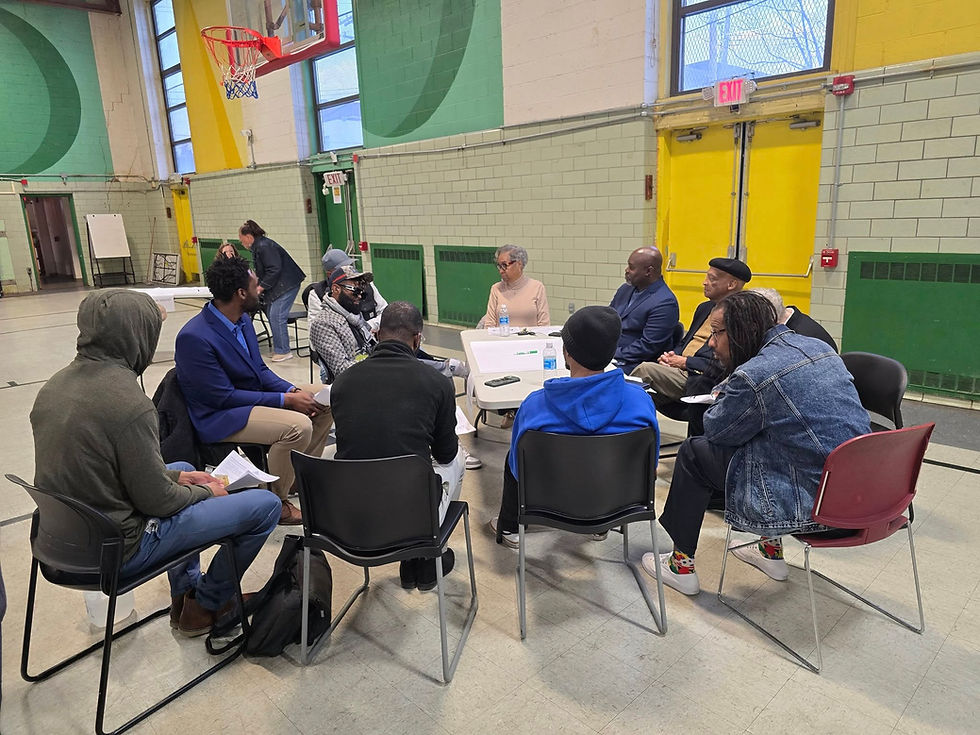MESSAGE TO BLACK LEADERSHIP
- CEA Team

- May 13, 2025
- 4 min read
Updated: May 13, 2025

THE UNFINISHED BUSINESS OF BLACK POLITICAL, SOCIAL, AND ECONOMIC EMPOWERMENT
We must collectively construct an urban agenda that is just, equitable, and inclusive of all people.
What role does Black leadership play in the institutional power structure dynamics of both the City of Pittsburgh and Allegheny County? Historically, it has not done an effective job in building a sustainable political organization or movement, especially when it comes to addressing the internal systemic and structural impediments that have prevented full access to resources within mainstream traditional power centers.
Realistic social justice programs that address the problems of the inner-city poor and working class must be developed, instead of continuing “business as usual” ritual politics, using posturing as a means to cover up or disguise the lack of effective leadership.
Black leadership must redefine its political interests and then cultivate and advocate for them in ways that make them relevant to current issues.
The Rehabilitation of Black Leadership Organizations
To rehabilitate Black leadership organizations, we must first reject the idea that simply having a group of capable individuals or heads of organizations automatically means we can fully understand the urban community and the range of national and local issues it faces.
Our community faces interconnected problems, each compounding the other. Now more than ever, Black leaders must come together to create forums that directly address key concerns raised by community members. Black leaders must provide dynamic spaces for dialogue around critical urban issues, ensuring that the ultimate beneficiary is the community itself.
Politicians and special interest groups often believe change can come simply by introducing new leaders into under-resourced communities. We must show that our community already holds the wisdom and capacity to define its problems and the expertise to move toward sustainable solutions. What we need are partners, politicians and institutions, who are willing to commit the resources necessary to support that work.
Framework for Collaborative Leadership
We cannot be effective in politically empowering our community unless our leadership is working democratically and in solidarity, within a diverse and inclusive framework that transcends ideological, religious, and perceived differences. Everyone must be given the opportunity to contribute strategies and ideas at a common table.

In addition, local and national development institutions would benefit from the creation of formal Black leadership networks and structures that allow for transparent, strategic collaboration in the political, social, and economic spheres.
There must be ideological clarity around Black leadership methodology and strategy, especially in the development of legislative and policy changes that advance our collective agenda.
Leaders must also cultivate public spaces where Black leadership organizations can network and build relationships. These informal spaces foster trust, communication, and natural leadership activity. Such networks can support teleconferences, planning dialogues, information sharing, and linkages to funding sources such as banks and foundations.
What binds us is our shared commitment to uplifting our communities and the families within them. Black leadership must rise to meet the challenges before us. Grassroots, elected, and appointed public servants must demonstrate unity, grounded in equity, diversity, inclusion, justice, and transparency.
A Unified Strategy, Structure, and Agenda for Effective Black Mobilization and Direct Action Campaigns
Our Black political leadership must adopt and share best practices across the board. We can begin by consulting on the development of a unified Urban Agenda in the following areas:
Community Economic Development
Business Development
Workforce Development (including training)
Youth Development and Recreation
Education
Public Safety
Mental Health
This common table will engage in a consensus-building process that includes:
Established Black Leadership
Black Elected Officials
Nontraditional Leadership
Faith-Based Leadership
Grassroots Leadership
Black Intelligentsia
Community Members
This group will establish an internal leadership structure, a mechanism for collective judgment and action through leadership circles, think tanks, and roundtable discussions. This unified strategy will help maximize and leverage political power, ultimately becoming a catalyst for community-wide mobilization and social reform.
This initiative will also produce recommendations to local political institutions, corporations, foundations, academics, and others that impact our communities.
Recognizing African American Contributions in Pittsburgh
Black leadership in Pittsburgh is scrutinized at multiple levels. Leaders must stand firm in principles of integrity, self-respect, honesty, transparency, and mutual consultation.
The construction and management of a local or national agenda requires a competent political infrastructure. More political institutions led by Black people must be established at the local, state, and national levels.

Black leadership, including both elected and appointed officials must show a unified front, rooted in values of equality, diversity, inclusion, and justice. Our voices must be lifted in defense of social justice and equal opportunity.
Historically, Black leadership has operated within two primary frameworks:
(1) Institutional Politics and
(2) Protest Politics.It is now time to explore and create new forms of political structures that can address our current economic and social challenges.
We must also broaden the base of political participation to include more voices in the decision-making process. Avoidance and accommodation are no longer options. We must form alliances in both economic enterprise and social activism.
We must engage all segments of the Black community, the underclass, the working and middle class, our youth, and college students. Leadership must break free from political marginality within both our own community and the larger political landscape.
Currently, many Black elected officials operate within a top-down organizational model with minimal connection to the grassroots. Their primary relationships often exist within elite circles, Black and White, leaving the masses disconnected. At best, this model yields occasional conventions, press releases, and legislative hearings, but delivers little tangible benefit to our communities.
Our appointed and elected Black leaders must raise their standards, set higher priorities, and build more effective electoral strategies that will lead to the meaningful empowerment of the Black community.
Join us for an engaging conversation as we discuss and strategize on vital community issues. This session aims to provide actionable solutions for tackling the systemic challenges facing our community.



Comments